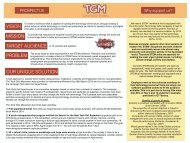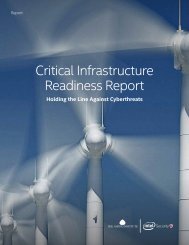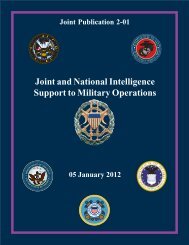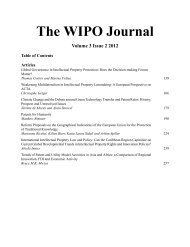Transparency Initiative (EITI)
2eoch1l
2eoch1l
Create successful ePaper yourself
Turn your PDF publications into a flip-book with our unique Google optimized e-Paper software.
102 Annex I: <strong>EITI</strong> Requirement 7 – Outcomes and Impact<br />
7.1 PUBLIC DEBATE<br />
The following Requirement 7 is reprinted from the <strong>EITI</strong> Standard<br />
2013/2016 for purposes of finding references.<br />
The multi-stakeholder group must ensure that the <strong>EITI</strong> Report<br />
is comprehensible, actively promoted, publicly accessible<br />
and contributes to public debate. Key audiences should<br />
include government, parliamentarians, civil society, companies<br />
and the media. The multi-stakeholder group is required<br />
to:<br />
a. Produce paper copies of the <strong>EITI</strong> Report, and ensure<br />
that they are widely distributed. Where the report contains<br />
extensive data, e.g. voluminous files, the multistakeholder<br />
group is encouraged to make this available<br />
online.<br />
b. Agree a clear policy on the access, release and re-use of<br />
<strong>EITI</strong> data. Implementing countries are encouraged publish<br />
<strong>EITI</strong> under an open license, and to make users aware<br />
that information can be reused without prior consent.<br />
c. Make the <strong>EITI</strong> Report available in an open data format<br />
(xlsx or csv) online and publicise its availability.<br />
d. Ensure that the <strong>EITI</strong> Report is comprehensible, including<br />
by ensuring that it is written in a clear, accessible<br />
style and in appropriate languages.<br />
e. Ensure that outreach events, whether organised by government,<br />
civil society or companies, are undertaken to<br />
spread awareness of and facilitate dia-logue about the<br />
<strong>EITI</strong> Report across the country.<br />
Overview: Regular disclosure of extractive industry data is of little<br />
practical use without public awareness, understanding of what the<br />
figures mean, and public debate about how resource revenues can be<br />
used effectively. The <strong>EITI</strong> Requirements related to outcomes and impact<br />
seek to ensure that stakeholders are engaged in dialogue about<br />
natural resource revenue management. <strong>EITI</strong> Reports lead to the fulfilment<br />
of the <strong>EITI</strong> Principles by contributing to wider public debate.<br />
It is also vital that lessons learnt during implementation are acted<br />
upon, that discrepancies identified in <strong>EITI</strong> Reports are explained and,<br />
if necessary, addressed, and that <strong>EITI</strong> implemenstation is on a stable,<br />
sustainable footing.<br />
7.2 DATA ACCESSIBILITY<br />
The multi-stakeholder group is encouraged to make <strong>EITI</strong><br />
Reports machine readable, and to code or tag <strong>EITI</strong> Reports<br />
and data files so that the information can be compared with<br />
other publicly available data by adopting Board-approved<br />
<strong>EITI</strong> data standards. As per Requirement 5.1(b), the multistakeholder<br />
group is encour-aged to reference national revenue<br />
classification systems, and international standards<br />
such as the IMF Government Finance Statistics Manual. The<br />
multi-stakeholder group is encouraged to:<br />
a. Produce brief summary reports, with clear and balanced<br />
analysis of the information, ensuring that the authorship<br />
of different elements of the <strong>EITI</strong> Report is clearly<br />
stated.









